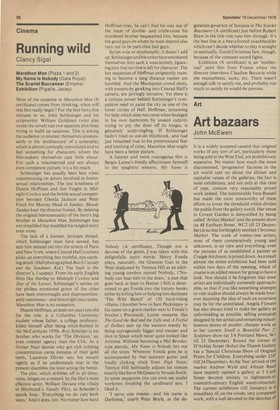Cinema
Running wild
Clancy Sigal
Marathon Man (Plaza 1 and 2) My Name is Nobody (Gala Royal) The Scarlet Buccaneer (Empire) Exhibition (PigaIle, Jacey) Most of the suspense in Marathon Man (X certificate) comes from thinking, when will this film really begin ? For the first forty-five minutes or so, John Schlesinger and his scriptwriter William Goldman (who also wrote the novel) run two separate plot-lines trying to build up suspense. This is asking the audience to interest themselves unnecessarily in the 'architecture' of a screenplay which is almost comically convoluted and to feel something for characters whom the film-makers themselves care little about. For such a misobserved and not always even competent picture, it's a bit much.
Schlesinger has usually been best when concentrating on actors involved in homosexual relationships. The lost loneliness of Dustin Hoffman and Jon Voight in Midnight Cowboy and the brittle sexual competition between Glenda Jackson and Peter Finch for Murray Head in Sunday, Bloody Sunday kept the director honest. By deleting the original homosexuality of the hero's big brother in Marathon Man, Schlesinger has not simplified but muddled his tangled story even more.
The lack of a human, intimate thread, which Schlesinger must have sensed, has sent him instead out into the streets of Paris and New York, where Conrad Hall's camera picks up everything but truthful, eye-catching detail. (Hall photographed Butch Cassidy and the Sundance Kid.) The fault is the director's, I suspect. From his early English films like Darling to Midnight Cowboy and Day of the Locust, Schlesinger's satires on the pitiless emotional grime of the cities have been overwrought and disproportionately venomous—and downright inaccurate. Marathon Man is no exception.
Dustin Hoffman, at least ten years too old for the role, is a Columbia University student whose father, a college professor, killed himself after being witch-hunted in the McCarthyite 1950s. Roy Scheider is his brother who works for 'The Division,' an even creepier agency than the CIA. As a former Nazi dentist who got rich robbing concentration camp inmates of their gold teeth, Laurence Olivier sets his mouth tightly as if he understands that in the present shambles the least acting the better.
The plot, which dribbles off in all directions, hinges on a remark by the film's most effective actor, William Devane (the villain in Hitchcock's Family Plot), as Scheider's spook boss: 'Everything we do cuts both ways.' And it does, too. No matter how hard Hoffman tries, he can't find his way out of the maze of doubleand triple-cross his murdered brother bequeathed him, because the good guys on whom he must depend also turn out to be part-time bad guys.
Script-wise or emotionally, it doesn't add up. Schlesinger and his writer have snookered themselves into such a wearisomely jigsawing plot that no time is left for character. The key sequences of Hoffman poignantly training to become a long distance runner are fumbled. And the Manhattan crowd shots, with passers-by gawking into Conrad Hall's camera, are jarringly intrusive. Yet there is a curious power behind Schlesinger's compulsive need to paint the city as one of the lower circles of Hell. Hoffman, screaming for help which does not come when besieged in his own bathroom by unseen culprits trying to pry the door off its hinges, is genuinely scalp-tingling. If Schlesinger hadn't tried to out-do Hitchcock, and had just remained true to his preternatural fear and loathing of cities, Marathon Man might have been a better picture.
A funnier and more courageous film is Sergio Leone's fondly affectionate farewell to the spaghetti western, My Name is
Nobody (A certificate). Though not a devotee of the genre, I was taken with this delightfully nutty movie. Henry Fonda plays, naturally, the Greatest Gun in the West shadowed by Terence Hill as an adoring young cowboy named Nobody. (`Nobody can beat him to the draw,' a pun that goes back at least to Homer.) Hill is determined to get Fonda into the history books either by killing him or helping him decimate 'The Wild Bunch' of 150 hard-riding villains. (Another bow to Sam Peckinpaw is his name on a grave marker next to Fonda's brother.) Previously, Leone westerns like The Good the Bad and the Ugly and A Fistlid of Dollars sent up the western merely by being outrageously bigger and meaner and shot in Spain which never quite looked like Arizona. Without becoming a Mel Brookstype parody, My Name is Nobody lets out all the stops. Wherever Fonda goes he is accompanied by that insistent guitar and loudly clicking clock from High Noon; Terence Hill habitually adjusts his stetson exactly like Steve McQueen in Nevada Smith. In some sequences you can even see studio workmen finishing the cardboard sets. I liked it.
`I serve one master—and his name is Darkness,' snarls Peter Boyle, as the de
generate governor of Jamaica in The Scarlet Buccaneer (A certificate) just before Robert Shaw in the title role runs him through. It's the best line in a heavyfooted swashbuckler which can't decide whether to play it straight or satirically. Good Christmas fare, though, because of the constant sword fights.
Exhibition (X certificate) is an 'intellectual' porn film from France where the director interviews Claudine Beccarie while she masturbates, sucks, etc. There wasn't enough talk to satisfy me, and probably too much to satisfy its would-be patrons.














































 Previous page
Previous page